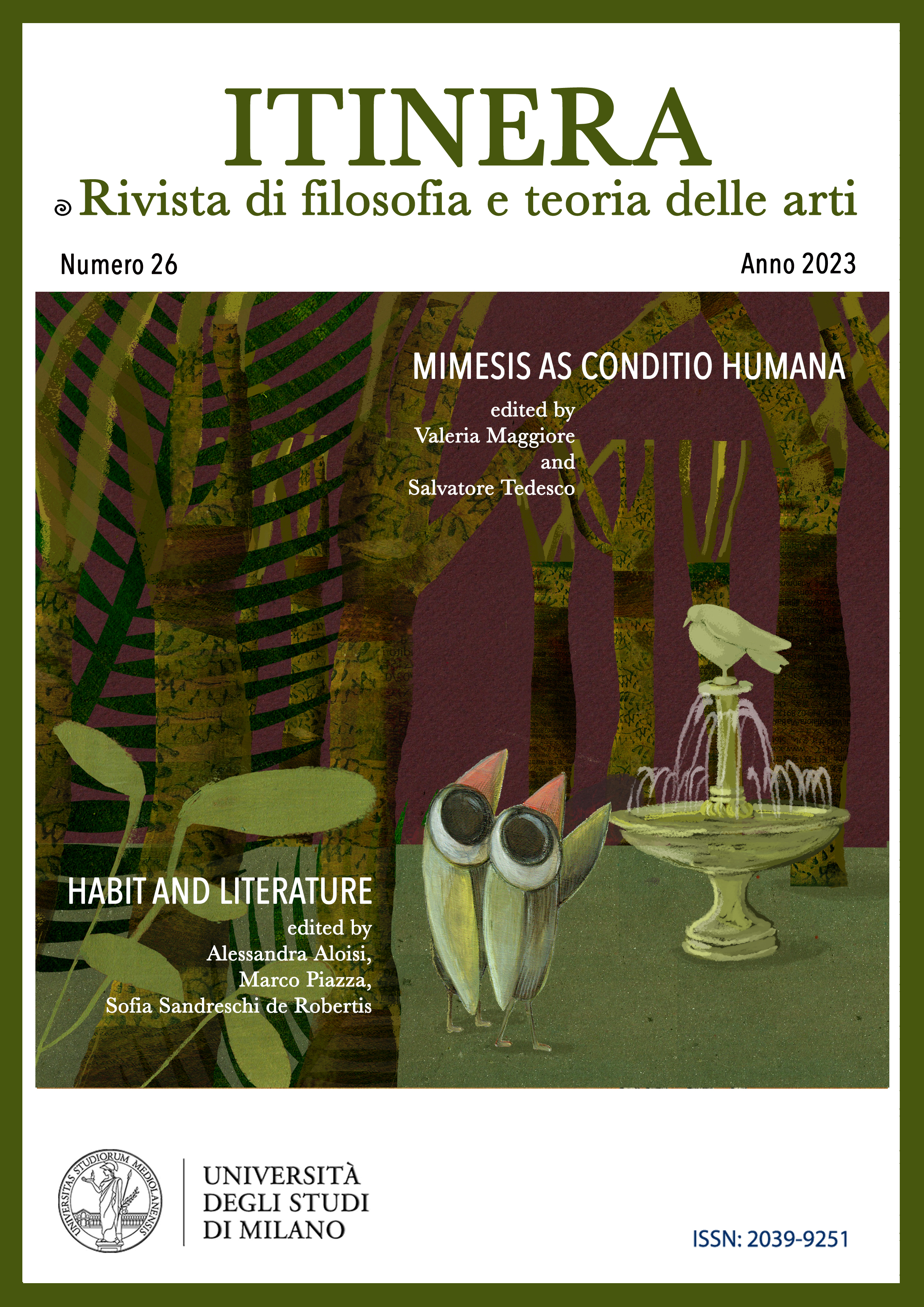Il ruolo dell’abitudine nella costruzione dell’identità morale in The Mill on the Floss e Middlemarch di George Eliot
DOI:
https://doi.org/10.54103/2039-9251/22253Parole chiave:
George Eliot, habit, moral identity, emancipation.Abstract
What is the boundary between unconscious habits and conscious actions? This is the question that drives all of George Eliot’s poetics centered on the importance of habit in the construction of her characters’ moral identity. The aim of this article is to analyze the author’s answers in this regard through two of her formidable novels: The Mill on the Floss and Middlemarch. In the first work, recovering the image, of philosophical- psychological origin, of the mind as a channel and making use of the analogies between animal and human behavior, Eliot proposes imaginative experience as a means of developing new cognitive capacities. But it is in Middlemarch that Eliot adds a further piece: unhinging the misogynistic prejudices attached to the concept of habit typical of the strongly patriarchal culture of the Victorian age. Pointing her satirical pen at the habits of her characters, Eliot invites readers to a critical attitude toward their own habits. Reading thus becomes an opportunity to reflect on our pervasive habits and achieve that gradual change towards the construction of a more mature and conscious moral identity.
Downloads
Riferimenti bibliografici
Allen, K.M., Habit in George Eliot’s The Mill on the Floss, in “SEL Studies in English Literature 1500-1900”, 50/4, 2010, pp. 831-852.
Brady, K., Women Writers: George Eliot, Palgrave-Macmillan, London 1992.
Eliot, G., Middlemarch, tr. it. di M. Bottalico, Mondadori, Milano 2020.
Eliot, G., The Mill on the Floss, tr. it. di G. Debenedetti, Arnoldo Mondandori, Milano 1980.
George Eliot to R. H. Hutton, London, 8 August 1863, in The George Eliot Letters, ed. by Gordon S. Haight, 9 voll., Yale Univ. Press, New Haven 1954-78, pp. 96-97.
Giddens, A., Modernity and Self-Identity, Stanford Univ. Press, Stanford 1991.
James, W., Principles of Psychology, ed. by F. H. Burckhardt, F. Bowers and I.K. Skrupskelis, Harvard UP, Cambridge 1979.
Judge, J., The Gendering of Habit in George Eliot’s Middlemarch, in “Victorian Review”, 39/1, 2013, pp. 158-18.
Paley, W., Moral and Political Philosophy, Liberty Fund, New York 1785.
Piazza, M., Creature dell’abitudine: abito, costume, seconda natura da Aristotele alle scienze cognitive, Il Mulino, Bologna 2018.
Shuttleworth, S., George Eliot and Nineteenth-Century Science: The Make-Believe of a Beginning, Cambridge Univ. Press, Cambridge 1984.
Wollstonecraft, M., A Vindication of the Rights of Women, ed. by C. H. Poston, Norton, New York 1975.
Dowloads
Pubblicato
Come citare
Fascicolo
Sezione
Licenza
Copyright (c) 2024 Gasponi

Questo lavoro è fornito con la licenza Creative Commons Attribuzione - Condividi allo stesso modo 4.0.
Gli autori che pubblicano su questa rivista accettano le seguenti condizioni:
1. Gli autori mantengono i diritti sulla loro opera e cedono alla rivista il diritto di prima pubblicazione dell'opera, contemporaneamente licenziata sotto una Licenza Creative Commons - Attribuzione - Condividi allo stesso modo 4.0 internazionale che permette ad altri di condividere l'opera indicando la paternità intellettuale e la prima pubblicazione su questa rivista.
2. Gli autori possono aderire ad altri accordi di licenza non esclusiva per la distribuzione della versione dell'opera pubblicata (es. depositarla in un archivio istituzionale o pubblicarla in una monografia), a patto di indicare che la prima pubblicazione è avvenuta su questa rivista.
3. Gli autori possono diffondere la loro opera online (es. in repository istituzionali o nel loro sito web) prima e durante il processo di submission, poiché può portare a scambi produttivi e aumentare le citazioni dell'opera pubblicata (Vedi The Effect of Open Access).





